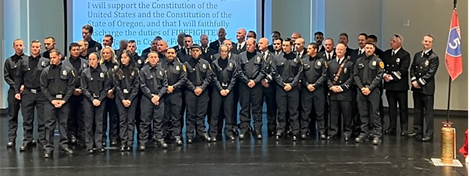Phoenix, OR – Seventeen local adult apprentices completed the first step towards new careers in firefighting, all receiving their badges for completing the firefighting academy basic training with Jackson County’s Fire District 5. The 100% pass rate of these special apprentices, through their rigorous “boot camp” experience, is just one part of their unique place in Oregon firefighting.
According to Aaron Bustard, Battalion Chief Jackson County Fire District No. 5, the Almeda fire and other extreme fire events around Oregon helped propel the development of a new training model to increase the number of firefighters across Oregon. “The state was interested in helping the fire service personnel become more representative of the communities we serve, and to be better able to respond to growing firefighting personnel needs,” said Bustard.
With the help of grants from federal and state sources, Fire District 5 (FD5) partnered with Rogue Community College (RCC) to create the curriculum and set up this “first-in-Oregon,” pilot project, where trainees receive wages and benefits while undergoing their training and classes. Students also receive advising and support to take required or supplemental courses at RCC that complete their firefighter and Emergency Medical Services training.
The goal of the program is to both increase the number of up-and-coming firefighters in the region and to recruit and support trainees from diverse backgrounds. College course advising and wrap-around supports for students augment the financial supports that come with the paid apprenticeship.
“The statistics show that over 1,200 firefighters are needed in Oregon. We also have nearly 1,200 professional firefighters who are eligible for retirement right now as well,” said Gary Heigel, RCC Department Chair of Emergency Services. “We are glad to support FD5 in their effort to meet these critical personnel needs.”
The 17 trainees who enrolled in the program in January 2022 are all high school graduates who present diverse economic backgrounds, physical attributes, and ethnicities, with ages ranging from 20 to 50. With the help of strong advising and support services, all 17 were able to complete the initial four-month academy basic training, alongside four additional FD5 incoming employees. Ten of the apprentice graduates are military veterans.
According to Bustard, apprentices in this first cohort receiving their badges (and awarded the official title of firefighter) include: Laura Ashland; Matthew Brix; Ayva Burkhart; Travis Cafferty; Brent Chapman; Nayely Contreras-Martinez; Henry Day Story; Caleb English; Lauren Fillipow; Gabriel Flores; Devon Heigel; Corbin Laird; Andres Marquez; Brian Morris; Brandon Ruiz-Remigio; Daniel Sarman and Alexander Van Zee. The additional academy graduates not participating in the apprenticeship include: Albaro Gonzales, Kyle Humphrey, Tony Incenty and Tanner Ryerson.
Over the course of 24 or 36 months, depending on their status prior to starting, each of these new firefighters must meet writing, math and communication class requirements and complete an introduction to emergency services course at RCC.
Beginning on May 30, each apprentice will be assigned a full-time shift with FD5 with standard novice firefighter pay and full benefits. They will concurrently advance their skills through Emergency Medical Technician (EMT) course work and licensure. Some will also pursue the Associate of Applied Science degrees in Fire Science and/or Paramedicine at RCC.
“Other fire department or fire district internships pay for the individual’s education but provide no training income, health insurance or retirement benefits,” said Bustard. “This is a very limiting factor in being able to recruit a diverse work force or allow individuals to support a family while making a career change.” This apprenticeship is the first in Oregon to offer a new path to a good wage career in firefighting.
Bustard and Heigel are hopeful that additional funding will be secured so that the model continues into the future. “We are glad that the State allowed us to develop this new program and placed it as a line item in the budget. We hope that our legislators continue to support it in the future. This does open doors to people who many not have the ability to go without income while training,” said Bustard.
Graduates of the program will serve FD5 fighting structure fires, as well as wildland, brush and grass fires. They will join strike teams serving across the State and will also aid in the efforts of fuels mitigation outside the fire season. “We will be able to double our staffing and put more firefighters in the field as a result of this program,” added Bustard.
Bustard and Heigel worked together with FD5 Fire Chief Charles Hanley, representatives of the Oregon State Fire Fighters Council and Oregon Commissioner of Labor and Industries, Val Hoyle, to design the coursework and training. “Several Oregon legislators strongly endorsed the new firefighter apprenticeship, and then added it to the budget during the 2020-2021 legislative session,” said Bustard. “Locally, Representative Pam Marsh and Senator Jeff Golden helped advance the legislation alongside lead-advocate, Representative Dacia Grayber of Tigard, who is a firefighter herself.”
Oregon’s HB5006 secured two years of funding that supports nine of FD5’s apprentices and a FEMA Staffing for Adequate Fire and Emergency Response (SAFER) grant provides three years of funding for eight of the apprentices. Two additional pilot sites, Clackamas Fire and Eugene-Springfield Fire, along Clackamas Community College and Lane Community College, will implement their apprenticeship programs in the coming months.
###
For media inquiries about this release or Rogue Community College, please contact Julie Raefield, M.A., Public Information Officer, Community and Government Relations Coordinator, at 541-956-7319, jraefield@roguecc.edu.
For additional information on the FD5 apprenticeship program, please contact Jackson County Fire District No. 5 Public Information Officer, Brian Olstad at: 541-535-4222, bolstad@JCFD5.com.

